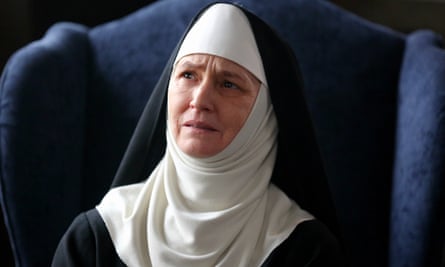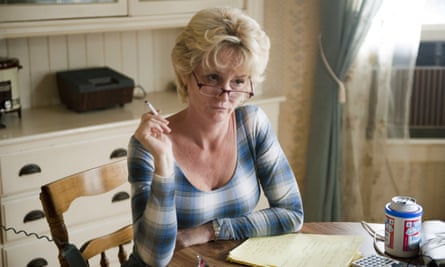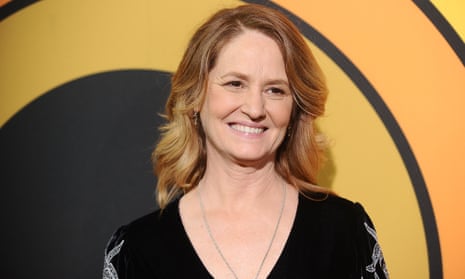About a third of the way into my interview with Melissa Leo, she stops talking; a curious, alarmed expression on her face. We’re in a conference room on the third floor of ABC Studios on the Upper West Side of Manhattan and Leo has spotted something.
“What the hell are those guys doing up there?” she says, motioning towards a water tower on the roof of a building close by. I’m struggling to spot exactly what she’s seeing, but there’s a rising sense of panic emanating from her.
“They’ve got some kind of uniform, they do,” she says, edging closer to the window. “They’re snipers!”
I quickly fumble in my bag to find glasses, squinting to see as two publicists come rushing over. But as quickly as the situation escalates, it dissipates with as much speed.
“You know what they are? They’re chimney sweeps,” she says, relieved, before offering up an impression of Dick Van Dyke in Mary Poppins.
In any other interview, this would seem strange, an incongruous and outlandish interlude within what can often feel like a stale Q&A formula. But not with Leo. The Oscar-winning actor, 57, has built a career on playing a range of eclectic, fascinating, often strange women, and in person there’s a similar eccentricity. In our 40 minutes together, I witness anger, upset, joy, paranoia and, yes, fear of a sniper attack. It’s often exhausting, but as with her work on screen, never dull.
We’re here to talk about her role in Novitiate, a drama that premiered earlier this year at Sundance. She plays the strict Reverend Mother of a convent in the 60s, struggling to deal with the Vatican’s loosening of a system she’s devoted her life to. It’s another barnstorming, scene-stealing, at times terrifying performance that, if buzz is to be believed, could see Leo back in the Academy’s good graces, having been nominated for her role in Frozen River in 2009 and then winning for The Fighter in 2011. It’s a character she disappears into, something of a trademark for her at this stage, and her deeply felt work belies a rushed backstory: she was offered the role just two weeks before production.

“It happens a lot with me,” she says. “I don’t quite know why that is. But I do know that it’s happened often enough where maybe somebody has dropped out of something last minute and they need someone. So I name myself Last Minute Leo because very often the job comes when they’re shit out of luck.”
Whether or not she’s always been the first choice, her post-Oscar career has seen a bounty of great roles, from an Emmy-winning guest slot on Louie, small but memorable cameos in The Big Short, Flight and Broad City, blockbuster work in Oblivion, The Equalizer and Olympus Has Fallen and, most recently, yet more awards-buzzed work in the Jim Carrey-produced TV drama I’m Dying Up Here. She’s a funny presence but can be equally fierce. When I mention her knack for playing intimidating, sometimes psychopathic characters, there’s a sudden and uncomfortable key change.
“Which psychopathic characters have I played?” she asks, a palpable tension now in the room.
I mention her role in Denis Villeneuve’s thriller Prisoners, where she plays a woman helping her husband to kidnap children as part of a “war on God”.
“I think she was a woman caught in circumstances,” she says, seemingly offended by my suggestion. After explaining her take on the character, she offers: “Psychopath? A loving mother. Unusual circumstances? Perhaps.”
I ask her if she has to look past certain initial labels when taking on such a character.
“I don’t look past!” she exclaims, volume rising. “It’s a judgment about the character, and no, you can’t come into the character judging them as you’re playing them. That’s the film-maker’s job to choose the tone in which the character is seen.”

There’s a sense of that nuance to her portrayal of the often abusive but never villainous Reverend Mother in Novitiate. Leo had previously spoken about her character in The Fighter very much being the product of a male writer-director, David O Russell, whose reputation paints him as difficult (Amy Adams said she was “devastated” on the set of American Hustle while his I Heart Huckabees row with Lily Tomlin is the stuff of viral legend). I ask her if working with a female director, as she does in Novitiate (and has done before in Frozen River and Sarah Michelle Gellar drama Veronika Decides to Die), leads to a less intense, more agreeable atmosphere.
“That’s not been my experience,” she says vehemently.
I prod for clarity.
“It’s a difficult thing for a woman to say, because I would really like more working women in all kinds of jobs, being a working woman myself,” she says, before proceeding, passionately, to tell me her theory. She believes that “women are not brought up to deal with things like jealousy, like competition” and that, thanks to sport, men undergo a far different journey.
“So very often when I’m working with a woman directing me, I feel like, and I’ve spoken to other female actresses, they don’t say it to you but they say it to me, it’s like she wants the job [of the actor]!” she says. “Well, honey, you want to do this? Then come up and do this! Oh, no, no, no, I don’t want. Well, why does it feel like that so much to me? I’ve never felt that way with a male director. So maybe in this time of truth-telling, it’s time to tell that truth as well.”
Leo’s made it clear in previous interviews that she doesn’t consider herself a feminist, originally in a 2012 interview and then again earlier this year. The statements were seen as contentious by some but Leo remains unhappy with any talk of gender. When I bring up the topic of sexual harassment, she stiffens.
“In my position, I’ve had all kinds of experiences throughout my career,” she says, an intense stare daring me to look away. “Here you are, you’re talking to me about being a woman. You’re not talking to me about being an actor, right? But that’s what I self-identify as – an actor first. I don’t have to self-identity that I have a [motions down] between my legs.”
She finds conversation about her choice of roles as a woman in her 50s to be “passé at this point” and would prefer to talk about her new dog. “Oh my God, he’s so cute” she says, suddenly flipping into cutesy mode. But there’s only so much mileage in talk of pets and we move on to something that I worry will bring more tension: politics.
Leo has often spoke about her liberal, “free-spirited” upbringing and I wonder how this has has left her feeling in an America with Donald Trump as president. “You’re saying ‘as a liberal’ and I’m reminding you that I self-identify ‘as an actor’,” she quips, annoyed. “My feelers tell me it’s some really bad times. The specifics? I turn the machine off. I look at the pictures in the paper sometimes. But I don’t read that stuff. I’m too sensitive maybe.” She goes on to talk about the “broken system” that she’s grown up in, getting choked up while talking about JFK’s assassination.

After we briefly cover her returning to the Oscar campaign trail that’s led to a self-promoting photo shoot in the past (“This is publicity for Melissa Leo, I’m an actor and the more known I am as an actor, the more opportunities for work I will get,” she tells me about the reasoning for our interview) we return to darker territory. In her last interview with the Guardian in 2011, she spoke about a director who once asked to see her breasts in a meeting. At a time when women in the industry are sharing their stories, is she more open to talking about it further?
“I’ve been through all kinds of experiences, and there are names I could name, but I can’t say anything with a notable name like some of the women are talking about, because I have always been the daughter my mother raised and I would definitely call bullshit on you,” she says, anger flaring. She then tells me a chilling tale of a hitchhike when she was younger that resulted in a driver repeatedly asking to fondle her – and then moves on to other forms of abuse in Hollywood.
“Things we could call abuse on the set?” she says. “Happens all the time. Sexual and otherwise. What about the abuse of the soul of the actor? You know what I tell directors when I go and work with them? This is a difficult part you’re asking me to go and do. I am asking you to hold my soul while I give that space in me to your character, and the more dangerous the woman is – say in Prisoners – the more you need to know and why I worked on that film is because Denis held my soul while I was her for him.”
Like much of the interview, this is delivered with uncomfortable intensity, and like much of the interview, she quickly flips into an entirely different mode directly after, while discussing the reason she hasn’t been sexually harassed in Hollywood. “I’ve always been a small-breasted, red-headed woman with little eyes,” she says, smiling. “It doesn’t happen to me. I don’t even get asked out on dates. I’m a single woman and not by choice. It’s not the first interview I’ve mentioned it in. The dog might help.”
Our time is over. I’m somewhat relieved. She apologizes for scaring us all with her sniper fears, before adding: “I think I’m going to not face the window.”
- Novitiate is in US cinemas on 27 October and in the UK at a later date

Comments (…)
Sign in or create your Guardian account to join the discussion